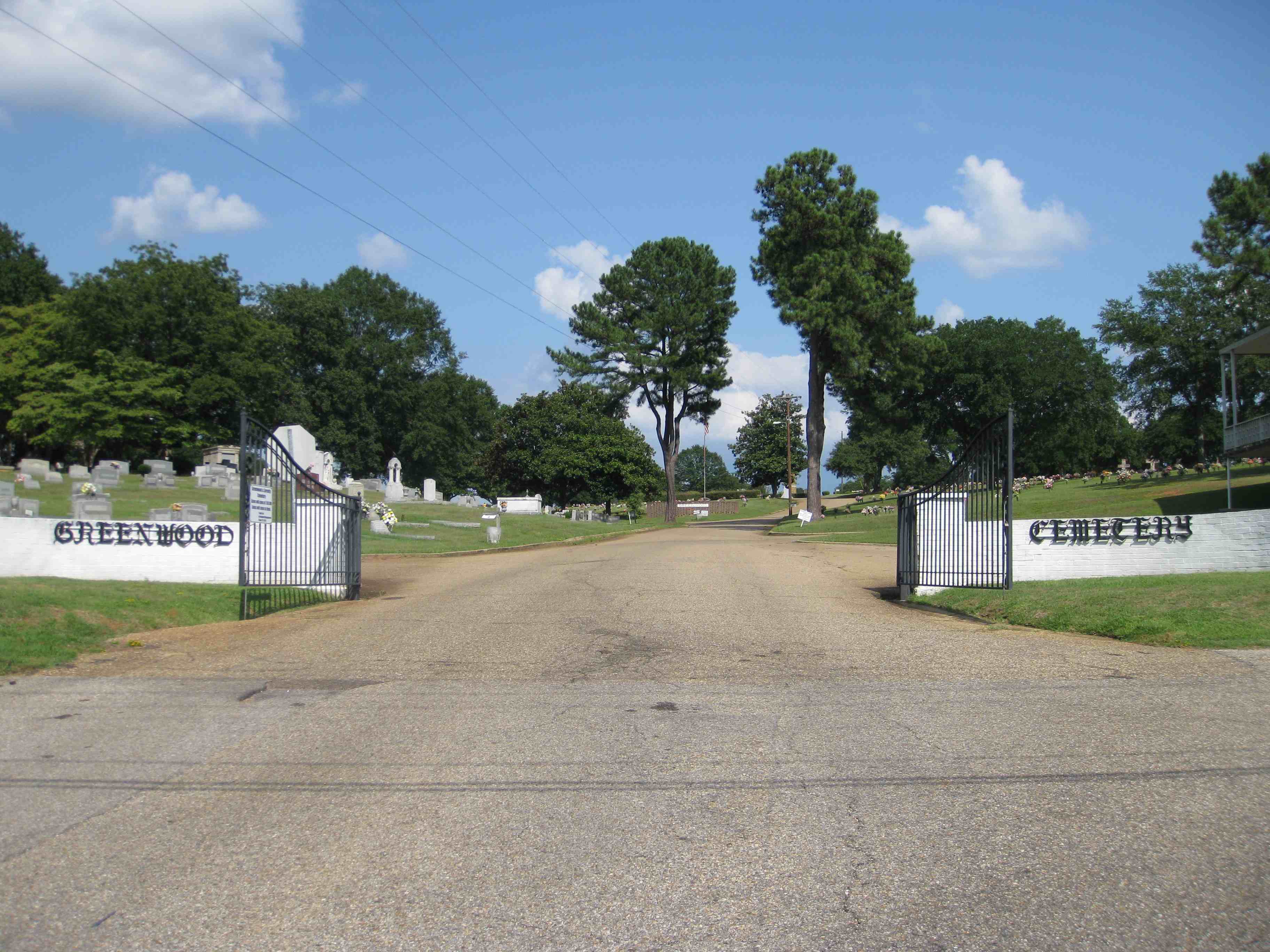Justus McDuffie
Barnes
1836-1913
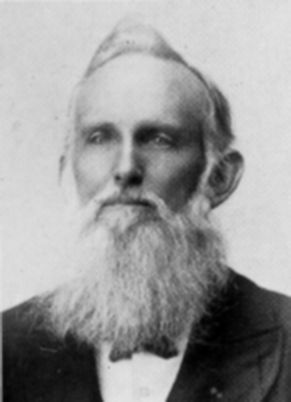
Biographical Sketch On The Life Of Justus M. Barnes
J.M. BARNES was born in Montgomery County, Ala., February 10, 1836, and brought up on an old-time Southern plantation. His father was a cotton planter and slave owner, and his plantation was but another name for plenty, prosperity, and happiness. There were no railroads in those days, and the plantation, therefore, had to be, in the main, self-supporting. Nearly everything needed on the place was produced and manufactured at home by the labor of slaves under the management and direction of the owner and proprietor. Corn, cotton, meat, and wool were produced on the plantation, and all farming implements and utensils were made in the plantation manufactory. Under the supervision of the chief mistress of the place, Negro women carded, spun, warped, sized, spooled, beamed, and wove cloth, from which they cut and made all the garments worn by blacks and whites. The great, stalwart negro men would come out on Sunday dressed in homespun corduroy, and the women could be seen about the negro cabins (which were called "the quarters") dressed in fresh, clean, homemade stripe or linsey gowns. Master and servants, children and all, wore homemade clothes.
J. M. Barnes was an only son, and the nurse and constant companion was a negro boy, some older than himself, named Ben. There was a sister-a babe-who was sometimes permitted to share their outdoor sports, and Ben often led the chase after rabbits over the fields and through the woods, with baby Frances on his shoulder and little Barnes at his heels, while Bulger, Screamer, and old Spring, three large curs{dogs}, with swift feet and lively yelp, soon put the frightened rabbit up a hollow tree. Then came the tug of war and the climax of excitement when Ben "twisted the fur" on the rabbit in the hole with a hickory switch and drew the little animal from its hiding place, to the music of yelping curs and hurrahing children. The wonderful sayings and doings of Ben are interesting chapters in the child life of J. M. Barnes; but Ben and Barnes drifted apart as they grew older and larger. Ben was sent to the field when old enough and large enough to make a regular hand at farm work, and Barnes found new companions in Henry, Will., Wade, and George, four negro boys a little younger than himself. These boys made as fine a team as ever trotted over Alabama soil, and Barnes harnessed them in sport to a little wagon, and drove them in a sweeping trot when on a pleasure ride, but more leisurely when heavily loaded on a business trip. With this wagon and team he hauled from the forest, which ran right up to the big house, much of the wood for dinner pots and bake ovens filled with victuals for whites and blacks on the big plantation.
Christmas on an old-time Southern plantation was a week of feasting and merrymaking. The banjo in the backwoods and a negro fiddler on a big plantation contributed more than tongue can tell or pen can describe to the old-time Christmas festivities 'way down South in Dixie.’ Both whites and blacks threw cares aside and feasted by day and fiddled and frolicked by night during a whole week.
As a boy, J. M. Barnes had music in his soul, hilarity in his feet, and harmless good humor in every fiber of his anatomy. His first efforts at dancing were under Ben's "patting" for music in early boyhood. This "patting" was an original negro accomplishment, and a few slaves on every plantation were masters of the curious art. It consisted of a series of slapping the hands on the thighs, patting the feet, and clapping the hands together in a kind of rhythmic clatter, to which the dancer timed his flying feet in difficult and complicated steps and shuffles with the precision of exact science and art. Nelson was the negro fiddler on the Barnes plantation, and his services were in demand the year round at frolics, which always came off in connection with quiltings, weddings, logrollings, corn shuckings, house raisings, and other public neighborhood convocations; but Christmas week Nelson and his fiddle did double duty as an inspiration for the hilarity of white folks at the big house and a musical stimulant for the frolics of negroes in "the quarters."
J. M. Barnes took his second lessons in dancing as a youth under Nelson's fiddling; but early in life he put away such childish amusements, under the teaching and influence of a godly and deeply religious mother, and consecrated his splendid talents to better things in the service of the Lord. The father' and mother of J. M. Barnes moved to Alabama. at an early day, while the country was almost an unbroken, primeval wilderness, occupied by uncivilized tribes of Indians and infested with deer, wild turkeys, bears, panthers, and other species of wild beasts. They married at the old Lumpkin home, near Strata, Ala., and began life together in poverty, and accumulated their property of slaves, stock, and well-equipped plantation by hard work, good management, and thrifty economy. The first time his mother heard the plea for a "thus saith the Lord" in all matters of religious work and worship, she accepted it, and for years she was the foremost defender of the truth in her section. She never for a moment relaxed her zeal in the work and worship of the Lord after she gave her heart to God. She carefully trained her children in the way of the Lord, and it was the joy of her life and the climax of her ambition when her only son became a Christian and determined to be a preacher. He never made a sacrifice or endured a hardship for the love of the truth as a preacher while his mother lived that she did not stand bravely by him with gentle, loving words of praise, comfort, and encouragement. When he would come home after weeks of hard work on preaching tours, she always listened with interest to his story of the hard battles he had fought, rejoiced with him over every victory he had won, and keenly sympathized with him in every persecution he had endured. When he was ready to leave home to go to Bethany College, at the age of seventeen, she handed him a sheet of paper on which she had written words of religious counsel and encouragement. Her heart was heavy with sorrow to see him go, and her tears fell fast on the paper as she handed it to him. He tacked the paper to the lid of his trunk, where it remained till it was destroyed by the fire which burned his house in 1883. Among the words he still remembers on that paper, he quotes the following: "Be your own self; never affect to be what you are not. Be kind and courteous to every one. Be polite and respectful to those older than yourself. Treat others as you would have them treat you. Trust God and serve him, and he will take care of you." She was a plain, matter-of-fact woman, who knew the Bible well and handled it skillfully.
Judge Bibb was a prominent politician in Montgomery County, a member of the Methodist Church, and a frequent visitor at the Barnes plantation when on a canvass. Mother Barnes took some interest in politics, but much more in Christianity. And she tried to show the Judge the error of his way in religion. The Judge made an effort to quote scripture to her in defense of his doctrine, but slipped in the quotation and misapplied the text. With the liberty of old friendship, Mother Barnes said, in her gentle and persuasive way: "Ah, Judge, I see you know more about politics than about the word of God." The Judge took the correction good-humoredly, and in after years he often told how Mother Barnes got the best of him in a religious argument.
The elder Barnes was blessed with a keen sense of justice, honesty, and integrity in business. He. was level-headed, practical, and plain in his manner of life. He landed in Alabama in 1818, with twelve dollars and five bits in money, and worked his way from poverty to plenty against obstacles that would have discouraged many other men. He never forgot his trials in early life, and never lived to see the day he did not keenly sympathize with those who had to struggle for existence. Old-time plantation negroes had a contempt for poor white, folks. A very poor man lived near the Barnes plantation, and three boys of the family rode one shabby old horse with a blaze in the face to school without a saddle. The Barnes negro Ben laughed at the three boys on one old, poor horse without a saddle, and little Barnes joined him in the fun. When Father Barnes came home at night, some one told him Ben and little Barnes had made fun of the poor boys. Father Barnes promptly gave them both a severe thrashing with the same cowhide, which taught little Barnes a lesson he never forgot. Mother Barnes was careful of the feelings of even the negroes on the plantation, and quick to correct her son when in early boyhood he showed any disposition to offend the colored people.
The
negro blacksmith on the Barnes plantation married a negro woman who was
born free. She interfered with the plantation work, and Father Barnes
ordered her to keep off his premises. Little Barnes saw her on the
plantation afterwards, and ordered her off. He was only ten years old, and
his assumption of authority wounded her feelings. He felt his importance,
but his manner humiliated her, and she wept. Some boys came to spend the
night with him, and he was full of frolic and fun; but his mother had a
sad and troubled look in her face, which soon depressed his spirits. He
knew something was wrong, for she usually took great interest in the play
when he had visitors. He went to her and asked her what was the matter,
but she told him to go back to his play, and she would tell him when he
was alone. He tried to play, but could bear the suspense no longer, and,
in a burst of sobs and tears, he threw himself into her lap, with his arms
about her neck, and begged her to tell him what troubled her. She then
told him he had been naughty, and she was sorry because he had insulted
the negro woman and wounded her feelings. He told her his father did not
want that woman to come on the place, and he ordered her off; but she said
he was too small to take such authority, and he ought to let his father
manage such matters. She told him how nice it was for little boys to treat
every one politely, and how it grieved her for him to be unkind, even to
the negroes on the place. He saw his error, confessed it, and she forgave
him. He never forgot, the lesson. From early childhood his parents
required him to treat others with kindness and respect. The poorer people
were, the greater the attention and respect they required him to show
them. 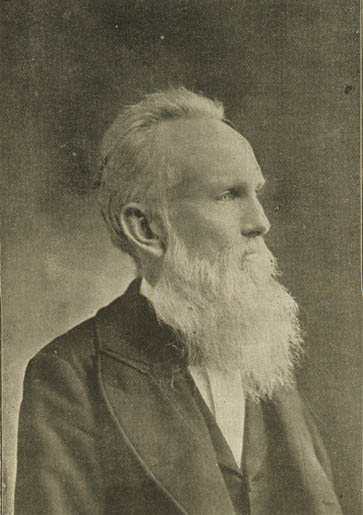
He entered Bethany College, West Virginia, being instructed by the venerable Alexander Campbell, in 1854, and graduated from that institution in 1856. After he graduated, he went back to his father's plantation, near Strata, Ala., a little village with a post office, a store, a blacksmith shop, and a public cotton gin. He wanted to begin business as a farmer, but his father said they needed a good school there, and urged him to teach. Accordingly, he began school, September 8, 1856, with thirteen pupils, in a log building on his father's plantation. The school prospered under his management, boarders came from different parts of the country, and Strata soon became an educational center of considerable importance. Barring an intermission caused by the Civil War, and another suspension caused by the financial crisis of 1873, the school continued to prosper under his management at Strata from 1856 to 1881, when it was moved a few miles to Highland Home, to which place S. Jordan and M. L. Kirkpatrick, two most excellent men who had married his only sisters, went with him and established Highland Home College.
This was a flourishing institution from the beginning, and its influence was felt and appreciated in nearly every state in the South. He remained at Highland Home till May 4, 1898, when he severed his connection with that institution, and, October 10, 1898, he opened a school in the city of Montgomery, where he is now living, teaching, and preaching.
Soon after the war he wrote some for the Southern Christian, published by the lamented J. M. Pickens at Mountain Home, Ala., and contributed several articles to the Christian Preacher, published by the late C. M. Wilmeth from Dallas, Texas; but by far the greatest part of his writing on religious subjects has appeared in the Gospel Advocate, of Nashville, Tenn.
In connection with writing and teaching, be has preached extensively in Alabama, Tennessee, Georgia, Florida, Kentucky, Texas, and other States. He has baptized hundreds of people and has established many churches in the regions where he has labored. As a preacher, a teacher, and a writer, he has always been especially noted for the closeness with which he adheres to the Holy Scriptures on all questions of religious work and worship. The religious people with whom he associates held cooperation meetings in the early years of his life as a preacher.
In October, 1865, he sprung a sensation in a cooperation meeting in South Alabama by boldly arguing that there is no more authority in the Bible for a cooperation meeting than for a synod, association, conference, or council. Not many more cooperation meetings were held south of the Alabama River, and his position is now generally accepted by the religious people with whom he associates throughout the South.
The last articles he wrote in the Gospel Advocate attracted considerable attention among the readers of that paper. He argued: (1) The word "ekklesia" should not be translated "church," but merely anglicized," so that God may be allowed to say to the world what he means." (2) When an ekklesia of God has elders who are bishops, they are able to take care of themselves, and ought to do it, without looking to pastors or any one else employed by the year for outside feeding. As Paul threw them upon their own resources then, it ought to be done now, and they should not be encouraged to look for weekly rations from any source. (3) The fourteenth chapter of 1 Corinthians is instruction for the ekklesia of God every time it comes together as a worshiping body.
He is a careful and constant student of the New Testament in the original Greek; and when he reaches a conclusion as to what the Bible teaches on any subject, he boldly states his position and contends earnestly for his convictions, but has never been dogmatic or sought to cause dissension or division. He has held that elders should be set apart by prayer, fasting, and laying on of hands, but has caused not disturbance over it. He puts special emphasis upon personal consecration, and insists upon the importance of religious services and Bible study daily in every home.
- F.D. Srygley, Biographies & Sermons, Nashville, Tennessee, c.1898 chapter 41, pages 395-404
Addenda:
The above sketch covers the life of J.M. Barnes until its production in 1898. However much was done by this great soldier in the last fifteen years of his life. He continued to educate through schools, and preached the gospel all over the south. He was known and respected throughout the brotherhood. Though small in stature he was a giant among leaders in the Restoration Movement in Alabama in the 19th and early 20th centuries.
In the spring of 1913 J.M. Barnes was driving down the road in a new automobile. An old negro friend who was working in a field waved and called to him. Brother Barnes took his eyes off the road for a moment to return the greeting. He lost control of the car and died from injuries on April 28, 1913. He was buried at the Greenwood Cemetery in Montgomery, Alabama.
See Another Sketch On The Life's Work Of Justus M. Barnes Here
Earl Kimbrough Lecture at Faulkner University 3 March, 2014
"Miss Polly": A History of Mary Lumpkin Barnes
_____________________________
Gospel Meeting Poster

Contributed by Charlie Wayne Kilpatrick
_____________________________
Directions To The Grave Of J.M. Barnes
Justus McDuffie Barnes is buried in the beautiful Greenwood Cemetery in Montgomery, Alabama. Just east of central Montgomery, take I-85 to Exit 3, Ann St. Exit, and go north. Go five streets to Highland and turn right. Go to the stop sign and you will be facing the entrance to Greenwood Cemetery. Enter the cemetery and go to the second drive to the left (Section 2 will be on your left as you turn). Less than 100 feet take another sharp left and proceed up the hill. Begin looking to your right. The Barnes Monument will be the third largest monument in Section 3 as soon as you top the hill (just before large tree), stop and proceed into section three five rows to find the Barnes Family plot. Also buried in this cemetery is the late former Governor and politician of the mid-20th century, George C. Wallace. Other preachers of note buried at Greenwood are Rex A. Turner, Sr. and Clyde E. Fulmer.
The location of the grave of J.M. Barnes has been somewhat of a mystery, at least to me. All references to the location of his grave was that he was buried in Greenwood Cemetery. In March, 2003, I visited the Faulkner Lectures one day, and took some time during lunch to go find the grave of J.M. Barnes. Records of his burial could not be found in the office, but a brief effort to find his grave was forthcoming, to no avail. Early in May I was in Montgomery again planning to spend a couple hours walking through the older part of the cemetery to see if I could find the grave. I walked for more than an hour with my son, Richard, to no avail. I had all but given up. As I was leaving, we were riding down the hill leading from the George Wallace monument when off in the distance, about 100 yards away, I saw a big monument that I could only make out the letters, "BAR." We went to investigate, and low and behold it was the grave of J.M. Barnes. I could not believe my eyes. I almost missed it again, but for some reason with thousands of graves all around, I saw this one grave way off in the distance. To say the least, it made my day! Hope you enjoy the shots. If you are ever in Montgomery, the grave of J.M. Barnes is a must.
_____________________________
GPS Coordinates
N32º 22.383' x WO 86º 15.844'
or D.d. 32.373051,-86.264188
Section 3 Lot 183
5th Space From S.W. Corner
View Larger Map
_____________________________
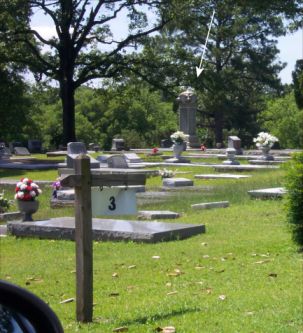
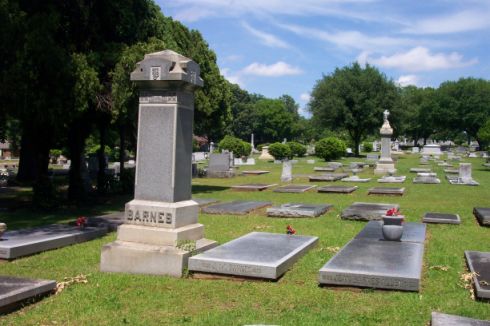
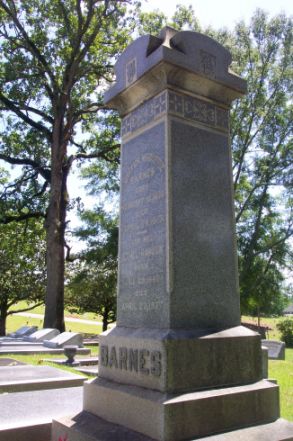
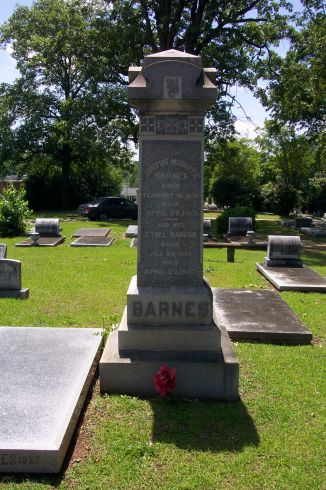
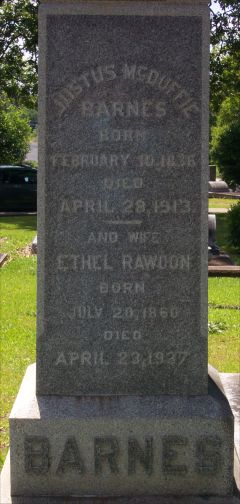
Justus McDuffie
Barnes
BORN
February 10, 1836
DIED
April 28, 1913
___________
And Wife
Ethel Rawdon
BORN
July 20, 1860
DIED
April 23, 1937
__________
BARNES
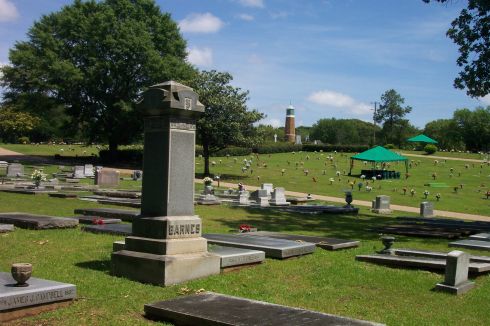
![]()
Site Of Highland Home College, Highland Home, Alabama
